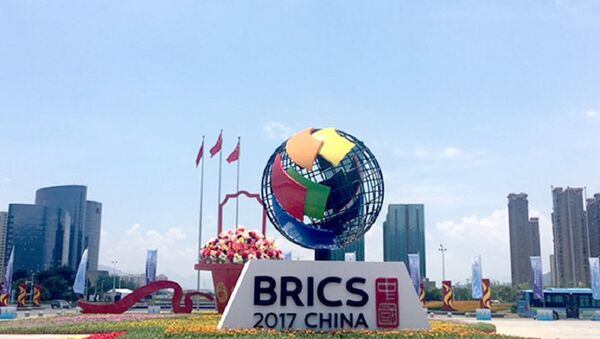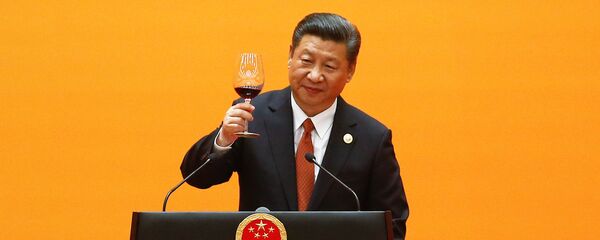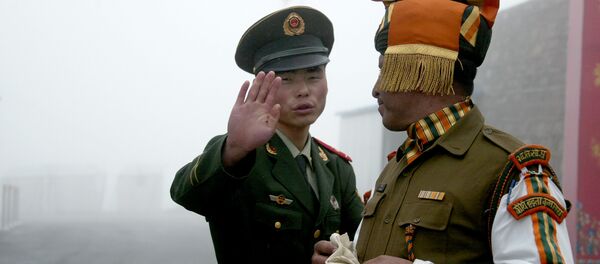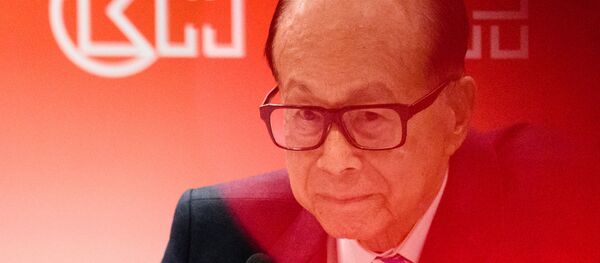MOSCOW (Sputnik), Tommy Yang — The BRICS countries are looking to have a stronger common voice in global governance at the 9th BRICS Summit scheduled to take place on September 3-5 in China, in addition to developing economic cooperation which brought them together in the first place, experts told Sputnik.
Leaders of the BRICS countries, namely Brazil, Russia, India, China and South Africa, are expected to take part in the international conference, along with leaders from Egypt, Guinea, Mexico, Tajikistan and Thailand.
POLITICS AND SECURITY
Chinese experts closely following the progress of the BRICS mechanism argued that it has evolved from a platform for emerging economies to strengthen their economic positions in the global economy to promoting new orders in global governance.
The Shanghai-based expert pointed out that the BIRCS nations demonstrated a kind of tactical mutual understanding and coordination on a number of international issues in recent years, such as the Civil War in Syria, Ukraine-related issues and climate change negotiations.
However, the Chinese expert admitted that India could become an unpredictable factor at the BRICS Summit, because of recent diplomatic scuffle with China, including a heated standoff over border disputes.
"It’s absolutely possible for India to stand out and become a roadblock for everything. At the recent foreign ministers meeting in Beijing ahead of the BRICS Summit, India had shown signs of this behavior by refusing to accept most of the proposals from China and holding onto their ‘anti-terrorism’ agenda, which in fact directly targets Pakistan. If this is the case, what you can do? You only can continue to be patient and persistent when dealing with India," Shen said.
BRICS DIFFERENT FROM OBOR
China and India had been locked in a border standoff for almost 10 weeks over the disputed area of Doklam (Donglang) near the Sikkim state, where New Delhi supports Bhutan’s territorial claims. Both countries resolved the dispute temporarily on Monday through a "mutual disengagement" agreement. Following the resolution of the border dispute, India’s Ministry of External Affairs said Tuesday that Indian Prime Minister Narendra Modi plans to attend the BRICS Summit in China.
"We believe the BRICS is an important mechanism, because it’s not a Chinese mechanism. It’s a multilateral mechanism that depends on everyone to make it work. Just because it’s held in China, it doesn’t mean we will not attend it. For us, the BRICS is an initiative where we’re also an equal partner with the Chinese," Jabin Jacob, a professor at the Institute of Chinese Studies in Delhi, India, told Sputnik.
The Delhi-based expert pointed out that the BRICS is very different from China’s One Belt One Road (OBOR) Initiative, which India refused to endorse and skipped a major international conference on the initiative in Beijing in May.
"The OBOR is a Chinese initiative where China is trying to take the lead. While it has the appearance of a multilateral organization, it is actually a collection of bilateral agreements. There are issues of lack of transparency. That’s why India has a problem. Under the BRICS, everybody is standing on an equal footing. Everyone has to agree before signing the joint document. In the case of the OBOR, everyone has to sign a document because the Chinese said you have to agree to it," Jacob said.
INDIA’S PRINCIPLES
The Indian expert asserted that while New Delhi views the BRICS as an important alternative to the traditional world order dominated by the West, India would never allow it to turn into an "anti-West" coalition led by China and Russia.
The Delhi-based expert gave an example that when the joint statement regarding internet freedom was released at last year’s BRICS Summit, it contained ideas that were against Indian values. According to the expert, India views restrictions on the internet over perceived threats as limiting to the freedom of speech.
At the same time, Jacob suggested that there are different ways to reshape the world order.
"We’re also in favor of reshaping the global order to make it more fair and balanced. If the Chinese idea is Chinese hegemony, then of course, that’s not working. We will not support that. We want a genuine multi-polar world," Jacob said.
UNCERTAINTY AHEAD FOR BRICS
The idea of BRIC was coined by Jim O’Neil, an economist at global investment bank Goldman Sachs, to describe the group of fast-growing emerging economies. However, sharp decline in commodity prices globally almost paralyzed the economies of Russia, Brazil and South Africa, which relied heavily on exports of natural resources. Only China and India were able to maintain relatively rapid economic growth.
The imbalance and disparity in terms of economic growth among BRICS members has caused some concerns for the future of this international mechanism, experts told Sputnik.
"The future is very uncertain. Only two countries have fast-growing economies. And it’s exactly those two countries that don’t get along very well. I don’t know about the future of BRICS in terms of concrete achievements. I think it will continue to exist as a platform for the foreseeable future," Harsh Pant, a professor of International Relations at King's College, London, and a distinguished fellow at Observer Research Foundation, told Sputnik.
According to the expert, many Indian observers argued that nothing came out of the previous BRICS Summit which was held in India in 2016.
The expert added that if India sees that it is not getting much out of this platform and Sino-India relations continue to be problematic, there will be some problems for the BRICS mechanism in the coming years.








